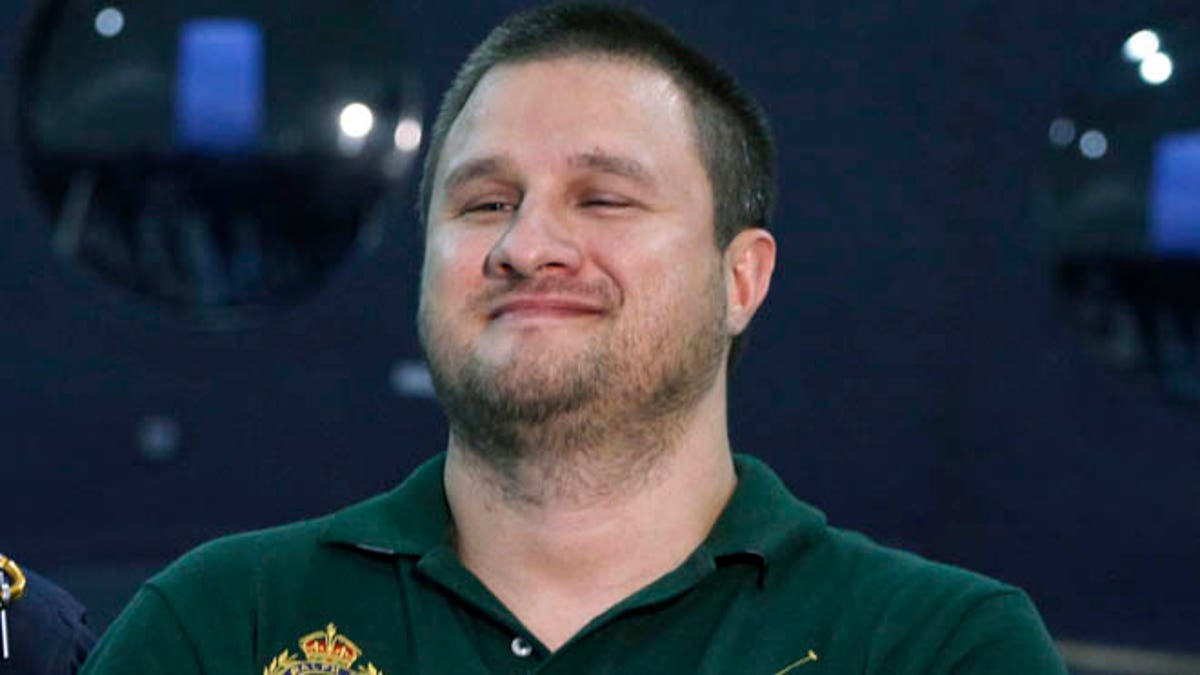
FILE - In this Aug. 31, 2010, file photo, Federal Police escort Texas-born fugitive Edgar Valdez Villarreal, center, stands during his presentation to the media in Mexico City. Villareal, known as "La Barbie" because of his light eyes and complexion, appeared before a federal judge Wednesday, Jan. 6, 2016, in Atlanta. He pleaded guilty to charges of conspiring to import and distribute cocaine and conspiring to launder money. (AP Photo/Alexandre Meneghini, File)
ATLANTA (AP) – A former Texas high school football player whom authorities say rose from petty street dealer to the top ranks of a Mexican drug cartel was responsible for sending truckloads of cocaine across the border for distribution in the eastern U.S., prosecutors said.
Edgar Valdez Villarreal, 42, is known as "La Barbie" because of his light eyes and complexion. Mexican police have said they chased him across five Mexican states for a year before they captured him on a ranch outside Mexico City in August 2010. He was among 13 people extradited to the U.S. in September to face charges.
Valdez pleaded guilty in federal court in Atlanta Wednesday to charges of conspiring to import and distribute cocaine and conspiring to launder money. Prosecutors have said he was responsible for sending thousands of kilograms of cocaine from Mexico for distribution in the eastern U.S. and shipping millions of dollars in cash back to Mexico.
The hearing was held under high security, with at least six armed U.S. marshals in and around the courtroom.
"Valdez's conviction is a victory for the people in both the United States and Mexico whose lives were affected by his cocaine trafficking, through drug addiction and community decay or through the violence and corruption associated with the cartel's daily business," said U.S. Attorney John Horn, who prosecuted the case.
Buddy Parker, an attorney for Valdez, had no comment after the plea was entered. Valdez's brother, who attended the hearing, also declined to comment.
Horn said it's impossible to know exactly how much cocaine Valdez is responsible for sending into the U.S., but he said that during one six-month period in 2005 at least 1,500 kilograms were sent to Atlanta alone. The cocaine was sold on a wholesale basis for between $16,000 and $18,000 per kilogram using a sophisticated network, Horn said.
Valdez was born in the border city of Laredo, Texas, where his father was a nightclub and bar owner. He grew up in a middle-class subdivision popular with border patrol agents, police officers and firefighters.
He became a small-time street dealer as a teen while at Laredo United High School where he was a linebacker on the football team and then climbed the ranks to become the head of a group of assassins for the Beltran Leyva gang, authorities have said. At the time Valdez began working with Beltran Leyva, the gang's leaders were associated with Joaquin "El Chapo" Guzman and the Sinaloa Cartel, Horn said.
He built a luxurious life for himself in Mexico with homes in the most expensive neighborhoods of Mexico City. But that was threatened when Mexican law enforcement targeted the Beltran Leyva gang, and Mexican marines killed leader Arturo Beltran Leyva during a gun battle in Cuernavaca in December 2009.
That set off a bloody fight for control between Valdez and Beltran Leyva's brother, Hector, authorities have said. Dismembered and decapitated bodies were found in the streets and often hanging from bridges in Cuernavaca and Acapulco along with messages threatening one of the two sides in the feud.
Acting on tips, an elite U.S.-trained Mexican federal police squad arrested Valdez and four associates at a woody vacation home outside Mexico City. At the time of his arrest in August 2010, then Mexican President Felipe Calderon called Valdez "one of the most-wanted criminals in Mexico and abroad."
Two of the charges to which Valdez pleaded guilty — conspiracy to import and distribute cocaine — carry a minimum sentence of 10 years and a maximum of life in prison, as well as a maximum fine of $10 million. The money laundering conspiracy charge is punishable by up to 20 years in prison and a fine of up to $500,000 or twice the amount of funds laundered. Valdez will be sentenced at a later date.
Another man, Carlos Montemayor Gonzalez, was extradited along with Valdez and also faces charges in the case. He has pleaded not guilty.
This story has been corrected to show the last name of the defendant is Villarreal, not Villareal.
